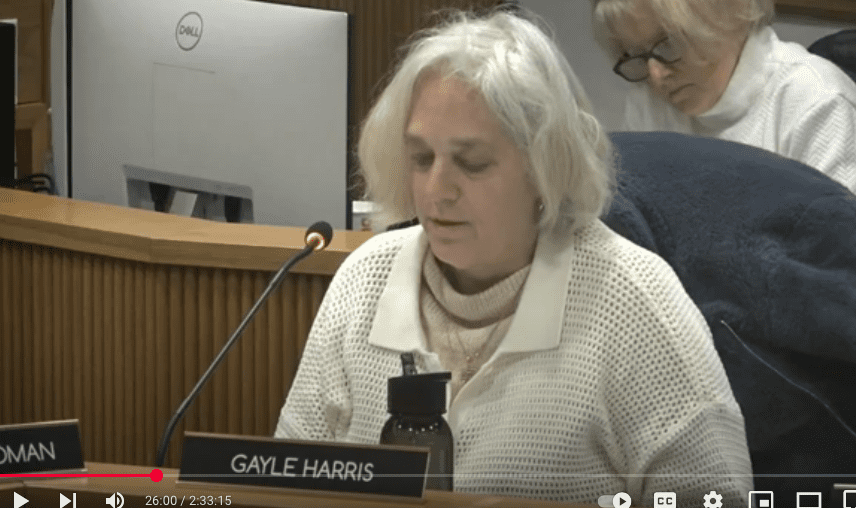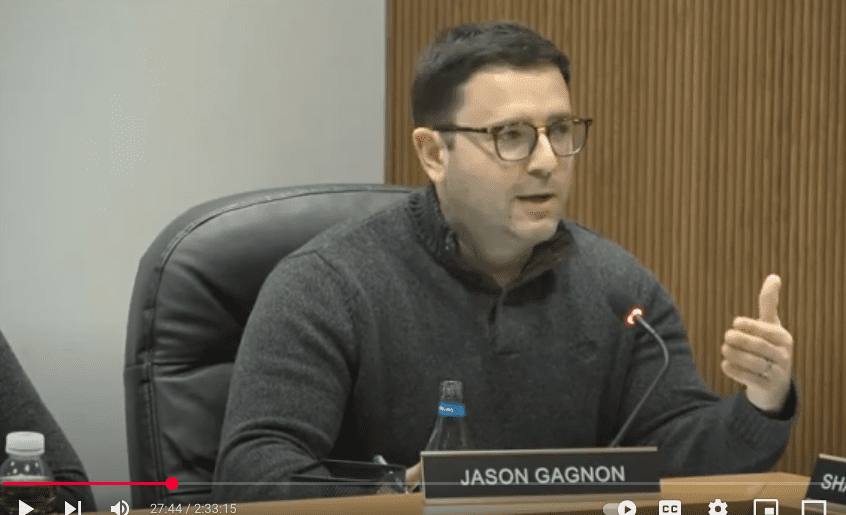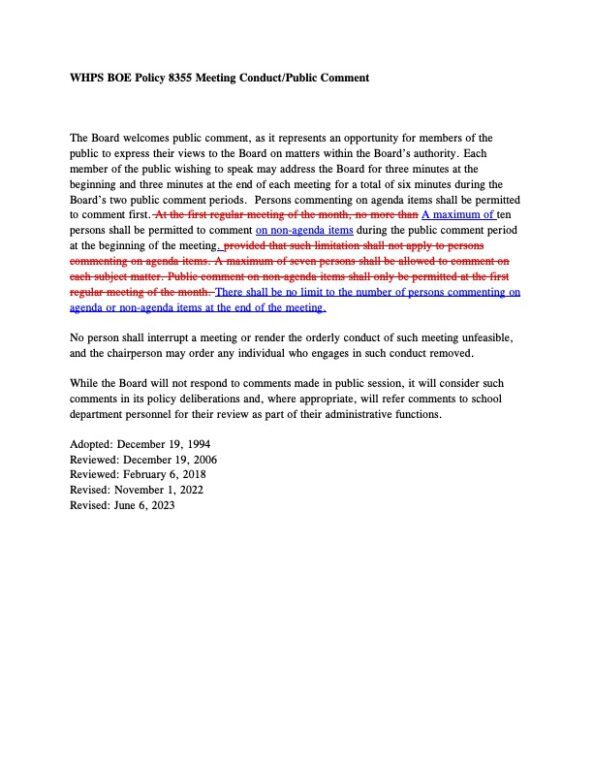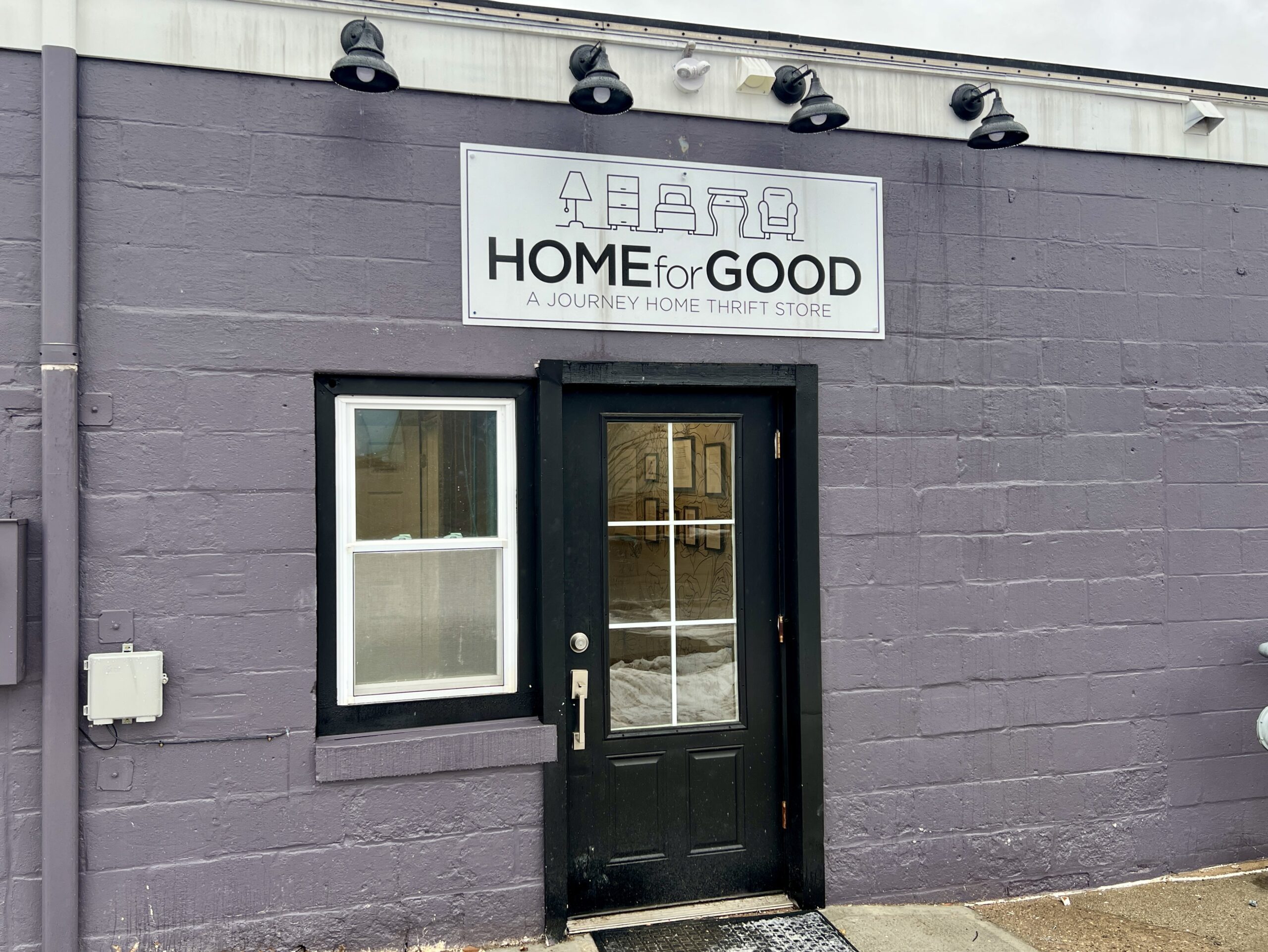West Hartford Board of Education Considering Another Revision to Comment Policy

Audio By Carbonatix

West Hartford Town Hall in winter. Photo credit: Ronni Newton (we-ha.com file photo)
The West Hartford Board of Education held a first reading Tuesday night of proposed changes to expand its policy on public comment.
By Ronni Newton
Since the fall of 2022, the West Hartford Board of Education has twice voted to change its policy regarding public comment at its meetings, and Tuesday night there was a first reading of another proposed revision – this time to remove many of the restrictions that have been recently imposed as well as to make the policy more straightforward.
A vote on the policy change proposed Tuesday night will be taken following a second reading at a future meeting, the date of which has not yet been announced.
The West Hartford Board of Education Policy 8355 “Meeting Conduct/Public Comment” was most recently revised on June 6, 2023 – the last meeting of the 2022-2023 academic year – and approved after a 5-2 vote along party lines. The action came after hearing from many in the community at a first reading in May 2023, and following extensive discussion by Board members.
Currently, as stated in the existing policy (see wording directly below) public comment on non-agenda items is only permitted take place at the first Board of Education meeting of the month. In accordance with the policy adopted in June 2023, members of the public who wish to comment on agenda items are permitted to speak first, all speakers are limited to three minutes, and there are overall limits on the number of speakers, and on the number of speakers on each specific subject during public comment at the beginning of a meeting. The Board has a second opportunity for public comment at the end of every meeting, and while speakers still have a three-minute limit, there is no restriction regarding the number of speakers per topic.
Existing WHPS BOE Policy 8355 “Meeting Conduct/Public Comment”:
The Board welcomes public comment, as it represents an opportunity for members of the public to express their views to the Board on matters within the Board’s authority. Each member of the public wishing to speak may address the Board for three minutes at the beginning and three minutes at the end of each meeting for a total of six minutes during the Board’s two public comment periods. Persons commenting on agenda items shall be permitted to comment first. At the first regular meeting of the month, no more than ten persons shall be permitted to comment during the public comment period at the beginning of the meeting, provided that such limitation shall not apply to persons commenting on agenda items. A maximum of seven persons shall be allowed to comment on each subject matter. Public comment on non-agenda items shall only be permitted at the first regular meeting of the month.
No person shall interrupt a meeting or render the orderly conduct of such meeting unfeasible, and the chairperson may order any individual who engages in such conduct removed.
While the Board will not respond to comments made in public session, it will consider such comments in its policy deliberations and, where appropriate, will refer comments to school department personnel for their review as part of their administrative functions.
Republican Gayle Harris, who has been a member of the Board’s Policy Subcommittee for several years, voted against the June 2023 revision. She said she’s now seen the existing policy in action since it was adopted and wanted to look at the policy again “because I don’t feel that the policy is working well over the last year or so that we’ve had the change.” Harris said she brought the topic to the Policy Subcommittee for consideration again with suggestions about how “to make it into a more clear and better policy.”

Board of Education member Gayle Harris outlined the proposed revision to the comment policy at the Jan. 21, 2025 meeting. Screenshot, West Hartford Community Interactive.
One of the other two members of the Policy Subcommittee, Democrat Jason Gagnon, also supports the newly-proposed comment policy revision. The other Policy Subcommittee member, Democrat and Board Chair Lorna Thomas-Farquharson, does not support changing the current language.
Gagnon, who joined the Board of Education after the most recent comment policy revision was adopted, said he echoed Harris’ opinion. “For a number of us on the Board, we’ve struggled with this policy,” he said Tuesday night.
The revision made in November 2022, and then further modified in June 2023, were actions that Gagnon said came from “a place of trying to address things like efficiency and trying to get to the business of the Board.”

Board of Education member Jason Gagnon, a member of the Policy Committee, speaks about the proposed revision to the comment policy at the Jan. 21, 2025 meeting. Screenshot, West Hartford Community Interactive.
What’s now being proposed, Gagnon said, will simplify the comment policy “for the parents and the citizens of West Hartford who give up their time” and come to meetings to be heard by the Board. He said all Board members have struggled sending some of the people away because they happen to come on a night that’s only for comment on agenda items. This policy “gets rid of that dichotomy” between first and second meetings, said Gagnon, still prioritizes agenda items, and gets rid of the cap on the number of speakers on a specific topic.
“I think what this policy does recognize is that it’s not easy for people who come to these meetings to speak publicly to the Board of Education,” not only having the courage to speak publicly but also the logistics of childcare, said Gagnon. And while the Board is able to vote to suspend its policy to allow someone to speak about a non-agenda topic, “also we struggle with ‘Who gets an exception?’; ‘Who is essentially worthy?’; ‘Whose topic rises to the level of getting an exception to our standing policy?’” Gagnon said.
“What we’ve tried to do is just a very simple policy that errs on the side of giving access to the Board of Education,” he said. Speaking before the Board may be someone’s first and only interaction with government, and “I think it is the one that deals with something that is important to all of us – our children.”
Thomas-Farquharson said Tuesday night that although she is a member of the Policy Subcommittee, she wants to be completely transparent about her opinion, which is that she is not in favor of the proposed revision. “My stance is not in alignment with how it has been reworded,” she said, noting that she respects her colleagues and the process for bringing forward the proposed change.
Thomas-Farquharson said she believes that while there have been some bumps in the road, overall the existing policy has been working and allows the Board to prioritize its agenda items. “We also recognize that hearing from the constituents, from the parents, that’s a priority as well,” she added.
The revision proposed Tuesday night, she said, “brings us back even further from the initial revision that was made” in 2022, because it would remove any limit to the number of speakers on an agenda topic.
“I think we have gotten into a good stride, a good pace,” Thomas-Farquharson said, and the Board appreciates hearing from the public and she thinks people have been respectful of the process.
Republican Ethan Goldman, who along with Harris cast one of the two votes against revising the policy in 2023, said he thinks the existing policy has flaws, and he brought up the problems last spring after learning that a parent had hired a sitter in order to be able to come speak at a meeting on a non-agenda item, but realized she came to the second meeting. “We voted to let her speak, which was the right thing to do,” Goldman said, but some people just walk away. “I think that’s unfortunate,” he said.
It’s not always clear to people what qualifies as an agenda item, and removing the restriction would remedy that situation, Goldman said. “New England has a long history of people speaking at public meetings, and I think that’s healthy,” he added.
While there have been issues that have generated public interest and brought crowds to speak at Board meetings in past years, recently there have been few commenters – including Tuesday night, when no one spoke at the beginning of the meeting. Information provided during a previous discussion of the comment policy indicated that over the course of the 2021-2022 academic year, there were 154 speakers who addressed the West Hartford Board of Education, for a total of 462 minutes. In the four prior years, there had been an average of 37 speakers during the course of the academic year.
“Our intent has never ever been to deter anyone from wanting to share and to speak,” Thomas-Farquarson said, but Goldman said the current policy is confusing. “I’d rather err on the side of letting people speak because people don’t necessarily come back,” he said.
The Board of Education generally meets on the first and third Tuesday of the month, and several Board members noted that there could have been confusion about whether Tuesday night’s meeting was the first or the second meeting of the month. On Jan. 7, rather than a regular meeting the Board held a workshop.
“Where there’s a burden to be placed … I think the burden should be on us, whether it’s a later night every now and then rather than someone came the wrong night or having to figure out what night it is,” Gagnon said. When determining whether or not it’s better to sacrifice efficiency or public access, he said, “I’m going to lean much more in favor of more open public access.”
Democrat Clare Taylor Neseralla said she doesn’t think the current policy is confusing to the public and sees no need for revision. The Board receives input from the public through other means, including phone calls and many emails – with some citizens emailing as often as twice a day, she said – and she said she thinks once a month for comment on non-agenda items is plenty. Boards of education in other area towns like Avon, Farmington, New Britain, and South Windsor meet just once a month, and their residents are not silenced by having fewer opportunities to speak, Neseralla said. She added that the West Hartford Board of Education comment policy is already broader than the Town Council’s policy.
“The proposed changing of this policy disrespects the intent behind our previous revisions as well as the vote and input of Board members,” Neseralla said. She said just two residents have objected to the past changes in the comment policy, and she thinks that the opportunity for comment once a month on non-agenda items allows Board members to hear what matters. At times in the past there has been an hour or more of comments before the business portion of the meeting can begin.
Harris said another problem with the current policy is that the Board is left with the decision of making an exception and voting to suspend its rules to allow certain people to speak. “I think that the Board becoming the arbiters of free speech is a very big problem,” she said, and deciding who can speak should not be in the purview of the Board. “We are putting ourselves in a very difficult situation,” she said, and the public should feel that the Board wants to listen to them and won’t be turned away.
Shannon Marimón, a Democrat, was not yet a Board member when the existing policy was approved, and said it has been “difficult to implement it with fidelity and consistency, and it does feel at times we are put in a difficult situation where you have to make a call and it feels like a slippery slope … so I am in favor of a policy change that makes this more clear.”
Both Marimón and Gagnon said the existing limit of seven people per topic seems arbitrary since if there are many who want to comment, it’s likely that topic has touched a chord.
Thomas-Farquharson said it was a long-standing policy to allow 21 minutes of comment per subject matter, and with a three-minute limit per person that would be seven speakers. She suggested that the proposed revision should have more guardrails because elimination of the number of speakers is broader than the policy was prior to any of the recent amendments.
“It was intentionally open-ended,” Gagnon said.
“It should be encouraging not discouraging,” said Goldman.
A second reading of the proposed change to the comment policy (below, and also attached as a PDF at the end of this article) will be held at a future Board of Education meeting, with a vote to follow.
Thomas-Farquharson noted that feedback from the public on the proposal is welcomed.

West Hartford Board of Education agenda
Like what you see here? Click here to subscribe to We-Ha’s newsletter so you’ll always be in the know about what’s happening in West Hartford! Click the blue button below to become a supporter of We-Ha.com and our efforts to continue producing quality journalism.
 Loading...
Loading... 



Woke is Broke